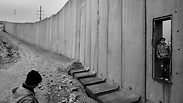
'Israel isn't isolated; the settlements are'
צילום: AP
Beware, boycott ahead
Op-ed: Israeli policy beyond Green Line is exacting a real, heavy price from us as consumer, academic boycotts gain momentum
The good news is that Israel is not in a situation of international isolation and is not even close to being in that situation. The bad news is that Israel is on a course of a head-on collision with some of its most important allies. The really bad news is that there are those who are trying to tell you there is nothing to do about it. It was always like this, and it will always be like this, between us and the evil gentiles.
Israel's international status is an issue which has been on the public agenda for years. On the left-hand side of the ring one can find the automatic pessimists who cry out, "We'll become South Africa in a minute." On the right-hand side stand those who, like our foreign minister, prefer to dismiss the matter with a complacent smile: "Boycott? What boycott? It's all paradise." Both are unwilling to deal with the sensitivities and complexities of Israel's relations with the world.
Historically speaking, our international status is a one-of-a-kind success story. Every prime minister since the State's foundation understood the huge importance of upholding tight relations with the West, especially in light of the regional isolation we have been sentenced to due to our location in a very unfriendly corner on the globe. The central place we have managed to buy for ourselves in the international community in a variety of fields – science, diplomacy, culture, military and intelligence – is an achievement we should be proud of.
Indeed, a factual review of the trade and diplomacy map shows that Israel is not isolated from the world: Sixty-five percent of Israel's export volume is based on free trade agreements. Thirty-four percent of our exports go to our main export partner, Europe, and 35% - to the United States.
The IDF enjoys a huge volume of funds in US aid and tight intelligence cooperation with the world's strongest power. The European Union has given us a unique diplomatic status, allowing Israel to participate in more than 1,200 of the EU's scientific projects and receive billions of shekels in high-tech and research grants.
Israel is not suffering from delegitimization: The entire Western world recognizes the State's right to exist as a member of the family of nations.
But the fact that we are not isolated doesn't mean we are not paying a growing price for failed political and diplomatic conduct. Wide-scale consumer and academic boycotts are a troubling phenomenon which is gaining momentum, and is even expected to increase in the coming years. Another expanding phenomenon is concealed boycotts: Trade or research partners which don't declare a ban, but avoid contact with Israeli institutions to escape negative public opinion.
A meticulous review of each of the boycotts from the past five years shows that they have all been directed at the settlements, and clearly distinguished between them and communities located within Israel's borders. The same applies to the official British recommendation not to invest in businesses in the territories; the labeling of products from the settlements, which is spreading across all European countries and South Africa; the decision to put off the upgrade of our relations with the EU; the lack of tax exemptions on settlement products in all European countries; etc. It's impossible to find a single boycott with real implications on the Israeli economy which denied the State of Israel's existence. Comprehensive and fiery boycotts only come from the very margins of the global political map and remain purely symbolic.
Our strategic alliance with the West is based not only on shared interests but also on shared values. Alongside the American and European interest in Israel's prosperity, they are as interested in solving the Israeli-Palestinian conflict. The shared values in light of which the West has been conducting itself in the past 50 years are not in line with ongoing military control over a population deprived of the right to self-determination.
Ignoring the international consensus is an irresponsible act which blatantly ignores reality. The State of Israel is not isolated, the settlements are. The Israeli policy beyond the Green Line is exacting a real, heavy price from us – and the future holds a swift, dramatic price hike. All Israelis who want to see an independent, strong state with a thriving economy here are faced with a clear choice between the Western world and the new mikevh in Itamar.
Dr. Assaf Sharon is the academic director of Molad – the center for the renewal of Israeli democracy and one of the authors of the study "Alliance in Crisis: Israel's Standing in the World and the Question of Isolation"










